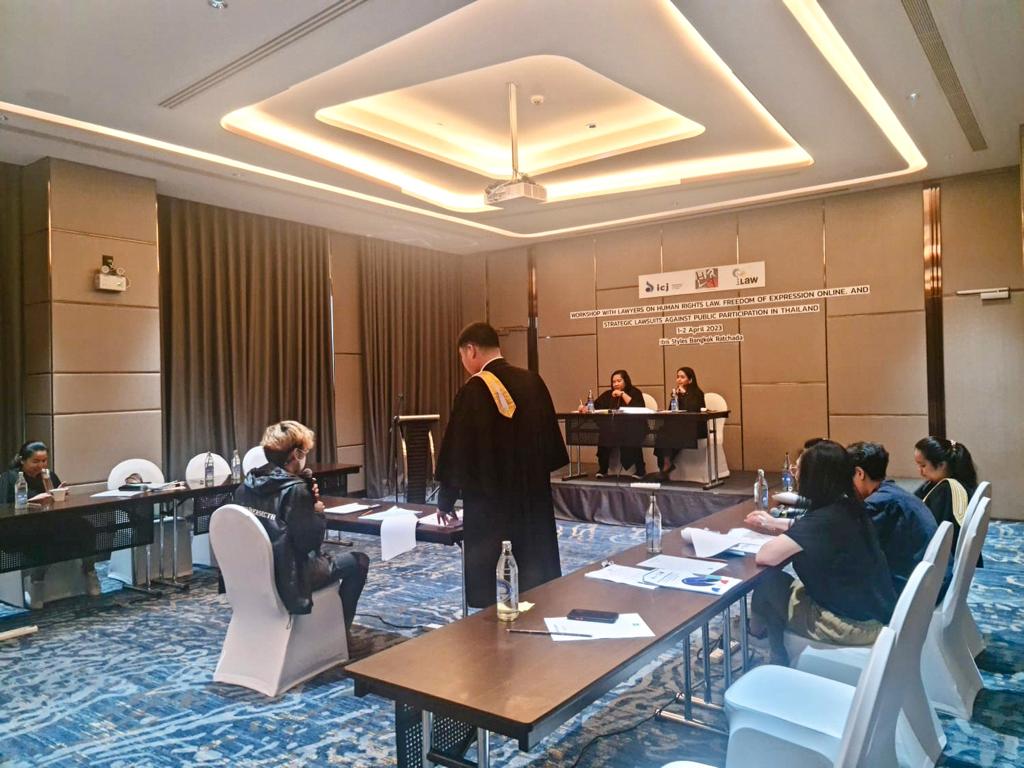A group of Thai lawyers discussed strategies for defending the rights of individual users who have been prosecuted based on social media content and ensuring that any use of digital information as evidence in criminal proceedings fully respects the right to privacy.
The discussions took place at the workshop organized by the ICJ, in collaboration with the Human Rights Lawyers Association (HRLA) and Internet Law Reform Dialogue (iLaw) Foundation, on 1-2 April 2023.
The Workshop on Human Rights Law, the Use of Digital Evidence in Criminal Trials, and Freedom of Expression Online, held in Bangkok, brought together 20 human rights lawyers from all the regions of Thailand.
In the past few years, the Thai government has filed criminal complaints and charges against a number of social media users solely for exercising their right to freedom of expression and opinion online. Cases have been brought pursuant to the offence of criminal defamation under sections 326 and 327 of the Criminal Code, articles 112 and 116 of the Criminal Code, section 14 of the Computer-related Crimes Act, and contempt of court provisions.
During the Workshop, participants discussed challenges around the use of digital evidence deriving from social media sites or other online platforms in criminal trials, the complication in assuring the chain of custody of such digital evidence, and the ways in which lawyers should consider approaching the use of this kind of information as evidence at trial.
The Workshop also featured discussions on the right to freedom of expression, information, association, political participation, and other rights, that Thailand is bound to protect pursuant to its international legal obligations.
Sanhawan Srisod, ICJ’s Associate International Legal Adviser, stressed that digital evidence is one tool that has increasingly been used to prosecute cases involving certain expressions, opinions, or information transmitted through electronic communication in Thailand. It was important to ensure that the acquisition and use of such information as evidence fully respects the right to privacy and the right to a fair trial guaranteed by the International Covenant on Civil and Political Rights (ICCPR), to which Thailand is a State Party.
During the Workshop, participants were divided into groups, analyzed hypothetical case situations, and delivered presentations in the form of a moot court.
At the end of the workshop, participants also discussed the possibility of pursuing strategic litigation, its practical tools, and guidance, in order to address Thailand’s unique prospects and challenges and exchange both the normative and practical issues faced by lawyers and civil society actors working on strategic litigation.
The speakers at the workshop were:
- Prof. Jittat Fakcharoenphol, Department of Computer Engineering, Kasetsart University;
- Nadthasiri Bergman, Chairperson, HRLA;
- Pimsiri Petchnamrob, ARTICLE 19;
- Sanhawan Srisod, Associate International Legal Adviser, ICJ; and
- Waranyuta Yan-In, iLaw Foundation
Further reading
Dictating the Internet: Curtailing Free Expression and Information Online in Thailand
Contact
Sanhawan Srisod, Associate International Legal Adviser, ICJ, e: sanhawan.srisod@icj.org





